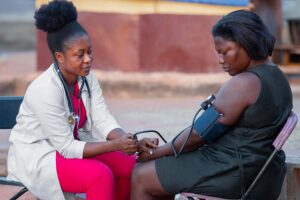Blood donation is a life-saving act, a simple way to make an incredible impact. Whether you’re donating plasma, platelets, or whole blood, your contribution is vital. But to ensure that your blood donation experience goes smoothly, preparation is key. In this guide, we’ll share practical tips to help you have a stress-free and rewarding donation experience.
Why Blood Donation Matters
Blood donations are crucial for saving lives in emergency situations, surgeries, and treating chronic conditions. With a severe shortage of blood donors in Nigeria, your contribution can make a world of difference. Donating blood is safe, and the benefits go beyond helping others; it can also positively impact your health.
1. Know Your Blood Group and Rhesus Factor
Before heading to the blood donation center, make sure you know your blood group and rhesus factor. This helps the medical professionals ensure that the blood you donate is compatible for use. Blood groups like O positive and A negative are in high demand, so your contribution is even more valuable if you’re part of these groups.
Additionally, if you’re unsure of your blood group, visit a medical facility to get tested. This is especially important if you plan to donate blood, plasma, or bone marrow regularly. Knowing your genotype and blood group is not only useful for donation but also essential for your overall health.

2. Hydrate and Eat Well
Proper hydration and a nutritious meal are key to a successful blood donation. Drink plenty of water (at least 2-3 liters) the day before and the morning of your donation. Avoid caffeinated drinks like coffee, which can cause dehydration.
Eat a well-balanced meal that includes foods rich in iron, such as leafy greens, red meat, and beans. A hearty breakfast will help stabilize your blood sugar levels and prevent dizziness or lightheadedness during or after the donation process.
3. Avoid Alcohol and Tobacco
The day before you donate blood, steer clear of alcohol and smoking. These substances can lead to dehydration and interfere with your body’s ability to produce enough red blood cells. For a smooth and safe donation process, it’s best to avoid these for at least 24 hours before giving blood.
4. Be Ready for a Simple Health Check
When you arrive at a blood donation center, expect to go through a quick screening process. This includes checking your temperature, pulse, blood pressure, and hemoglobin levels. If you have a cold or are feeling unwell, it’s important to reschedule your appointment to avoid complications. For a successful donation, your health is the top priority.
5. Wear Comfortable Clothing
You’ll be asked to roll up your sleeves for blood donation, so choose loose-fitting clothing with sleeves that can easily be rolled up. Avoid wearing tight or layered clothing, as this can make the donation process uncomfortable.
6. Understand the Blood Donation Process
Knowing what to expect during the blood donation process can help reduce any anxiety you might feel. Here’s a step-by-step overview:
-
Registration: You’ll need to provide some basic information and sign a consent form.
-
Health Screening: As mentioned, you’ll undergo a brief health check.
-
Donation: The actual donation usually takes 10-15 minutes, depending on whether you’re donating whole blood, plasma, or platelets.
-
Post-Donation Rest: Afterward, you’ll be asked to sit down and rest for about 10-15 minutes while you drink a refreshing beverage. This helps restore your energy.
7. What Happens After You Donate Blood?
After your blood donation, the blood is tested for various diseases and stored in a blood bank until it is needed. If you’re donating plasma or platelets, your blood is typically processed through a machine in a procedure called apheresis. This allows the plasma or platelets to be separated from the rest of the blood, which is then returned to your body.
Plasma donation and stem cell donations are especially critical for patients with cancer, burn victims, and those with blood disorders like sickle cell anemia. Your donation may also be used for bone marrow transplants, blood cord banking, and private cord blood banking.
8. Risks and How to Minimize Them
While blood donation is a safe and essential process, there are some potential risks, such as dizziness or fainting. This is why it’s crucial to hydrate, eat properly, and rest after the donation. If you’re feeling unwell or have any concerns, always consult with the medical professionals at the donation center. It’s better to be cautious than risk an adverse reaction.
9. Give Blood, Save a Life – Book Your Donation Now!
The need for blood is constant, and donations can make a life-saving difference. Whether you’re donating whole blood, plasma, platelets, or even considering bone marrow donation, your efforts can help save lives in Nigeria. By donating, you not only provide a crucial resource for those in need but also enjoy health benefits like improved circulation, reduced iron levels, and healthier skin.
Ready to make an impact?
Book your blood donation today!
Contact us at info@oneusng.com or call +234 902 168 2822. Alternatively, visit Oneus’s website to learn more about the donation process, blood drives, and how you can be a hero in your community.
Blood donation is one of the easiest and most fulfilling ways to make a real difference. Don’t wait—give blood, save a life today!




